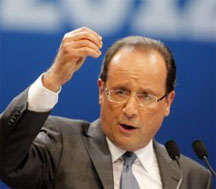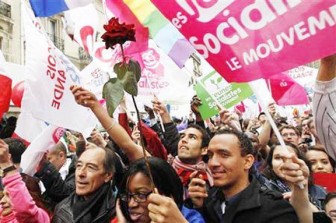PARIS, (Reuters) – Socialist Francois Hollande swept to victory in France’s presidential election yesterday in a swing to the left at the heart of Europe that could start a pushback against German-led austerity.

Hollande beat conservative incumbent Nicolas Sarkozy by a decisive 51.9 percent to 48.1 percent, based on partial results, bringing the centre-left back to government after a decade in opposition.
The outgoing president conceded defeat within 20 minutes of the last polls closing at 8 p.m. (1800 GMT), telling supporters he had telephoned Hollande to wish him good luck.
“I bear the full responsibility for this defeat,” Sarkozy said, indicating he would withdraw from frontline politics.
“My place can no longer be the same. My involvement in the life of my country will be different from now on.”

Punished for his failure to rein in 10 percent unemployment and for his brash personal style, Sarkozy was the 11th euro zone leader in succession to be swept from power since the currency bloc’s debt crisis began in 2009.
Jubilant left-wingers celebrated outside Socialist Party headquarters and thronged Paris’s Bastille square, where revellers danced the night away in 1981 when Francois Mitterrand became France’s only previous directly elected Socialist president.
But the celebrations may be overshadowed by a political bombshell in Greece, where mainstream parties were hammered in a parliamentary election that exit polls suggested may leave supporters of Athens’ IMF/EU bailout without a majority, raising doubts about its future in the euro zone.
Hollande’s clear win should give the self-styled “Mr Normal” the momentum to press German Chancellor Angela Merkel to accept a policy shift towards fostering growth in Europe to balance the austerity that has fuelled anger across southern Europe.
His solid margin also positions the Socialists strongly to win a left-wing majority in parliamentary elections next month, especially since the anti-immigration National Front is set to split the right-wing vote and hurt Sarkozy’s UMP party.
If it wins that two-round election on June 10 and 17, the Socialist Party would hold more levers of power than ever in its 43-year modern history, with the presidency, both houses of parliament, nearly all regions, and two-thirds of French towns in its hands.
Even before the results were declared, cheering crowds gathered at Socialist headquarters to acclaim the party’s first presidential victory since Mitterrand’s re-election in 1988. Many waved red flags and some carried roses, the party emblem.
In Bastille square, flashpoint of the 1789 French Revolution and the left’s traditional rallying point for protests and celebrations, activists began partying before the final polls closed and cheered as giant TV screens relayed the results.
Hollande, a mild-mannered career politician, led the race from start to finish, outlining a comprehensive programme in January based on raising taxes, especially on high earners, to finance spending priorities and keep the public deficit capped. He has vowed to balance France’s budget by 2017, but economists say he is likely to have to make public spending cuts soon.
As much as his own programme, Hollande benefited from an anti-Sarkozy mood due to the incumbent’s abrasive personal style and to anger about the same economic gloom that has swept aside leaders from Dublin to Lisbon and Athens.
Sarkozy’s supporters consoled themselves with the fact that the margin could have been worse, preserving their hopes for the parliamentary elections. “People were talking about an anti-Sarkozy tsunami,” Foreign Minister Alain Juppe said. “That’s not what happened.”
SARKOZY NEEDED
A MIRACLE
Sarkozy launched his campaign late and swerved hard to the right between the two rounds of voting as he tried to win back low-income voters that polls show have ditched him for the radical left and the far right.
His aggressive rallies and promises to reduce the number of immigrants, crack down on tax exiles and make the unemployed retrain to get benefits barely dented Hollande’s lead. Sarkozy also failed to land a knockout punch in their only television debate, which polls showed many thought Hollande edged.
In two further blows in the last days of the race, far-right leader Marine Le Pen, who won 17.9 percent in the first round, and centrist Francois Bayrou, who polled 9.1 percent, refused to endorse the conservative president.
Le Pen, who campaigned on a platform of leaving the euro and restoring trade barriers, vowed to lead “a real opposition that is ideologically distinct”, predicting that Sarkozy’s UMP party would implode.





